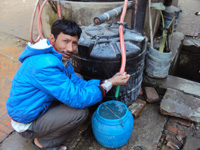
Mount Abu notification sparks protests
mount Abu, in Sirohi district, Rajasthan was shut down from November 13 to 15. This was after the state's wildlife department issued a notification on October 4, 2006 declaring the area a wildlife

mount Abu, in Sirohi district, Rajasthan was shut down from November 13 to 15. This was after the state's wildlife department issued a notification on October 4, 2006 declaring the area a wildlife

Let s understand that species have both aesthetic and utilitarian values
While the buzz of e commerce has been accepted, the discordant noise of environment has been conveniently left out
Envisages generation of one million direct and indirect opportunities The plethora of subsidies and incentives announced in the new exclusive policy for the micro, small and medium enterprises (MSMEs) sector by the Tamil Nadu government will create a large employment potential. New opportunities will be thrown open for artisans, ITI and diploma holders in the state to come and set up their own units, according to small industry associations. Tamil Nadu has unveiled a separate policy for the MSME sector with a vision to enhance the competitiveness of the sector and aim for a sustained annual growth rate of over 10 per cent for MSMEs. The new MSME policy, apart from encouraging agro-based industries, envisages generation of one million direct and indirect employment opportunities during the 11th Five Year Plan. The new MSME policy pampers tiny manufacturing units with capital subsidy on plant and machinery, low-tension power tariff subsidy, subsidy on assessed VAT and stamp duty exemption. Over and above this, the additional subsidies for units set up by women entrepreneurs, physically disabled persons and trans-gender entrepreneurs will be highly rewarding and encouraging, says S Srinivasan, president, Ambattur Industrial Estate Manufacturers' Association. New entrepreneurs and the small scale sector could reap the benefits of the current policy and become a regular feeder sector for the vibrant medium and large-scale sector, especially active in the automobile and engineering sectors in the state, he adds. K Gopalakrishnan, honourary general secretary of Tamil Nadu Small and Tiny Industries Association, says the policy will give fillip to the MSME eco-system in the state. The subsidy schemes will help small industry upgrade technology and machinery, thereby enhancing their competitiveness. The purpose of announcing a separate policy for the MSME sector is to make it co-exist with large industries as well as accelerate industrial growth and generate large-scale job opportunities, especially in the rural and backward areas, says P Selvam, secretary, small industry, government of Tamil Nadu. "With this new policy, we expect MSME sector contribution to the total exports from Tamil Nadu to go up substantially from the present 35 per cent,' he adds. Growing industrial demand has driven expansion by several units in the industrial estates, which are considered the growth engines of small and medium enterprises in and around Chennai. However, the units point out that land is not readily available for these units and expansion to other areas will prove to be unviable. The MSME policy prescribes, among other incentives and subsidies, reservation of 20 per cent of the land in all SIPCOT (Tamil Nadu Small Industries Development Corporation) industrial estates for MSMEs and upto 30 per cent for micro industries within SIDCO estates. This initiative is expected to help the small industry in a big way. Small industry bodies have for long pointed out that skyrocketing land prices caused by rampant SEZ promotion is affecting small industry growth. The policy also talks of enacting an Industrial Single Window Clearance Act for single window committees at the state and district levels and authority for setting time periods for approvals. The state government also plans to develop 22 new industrial estates in several parts of the state. Presently, there are about 78 industrial estates in Tamil Nadu. Locations for the new industrial estates have been identified and the government has also acquired lands for the these new estates. Lauding the state government for announcing a policy for revival of sick MSMEs, Srinivasan urges the government to undertake a detailed study on the causes of sickness. He points out that a primary cause for sickness is non-payment of supplier bills by medium and large industries; besides, lack of financial support, non-availability of technology, product process obsolescence, interrupted power supply and labour issues. The MSME sector in Tamil Nadu accounts for over 95 per cent of all industrial units, about 40 per cent of the output in the manufacturing sector and 35 per cent of exports. There were about 5,30,000 registered micro and small scale units as on March, 2007, providing employment to over 37 lakh people with a total investment of around Rs 16,817 crore. There is also a substantial unregistered sector of over 600,000 units which serves as a nursery for entrepreneurial talent, according to the MSME policy statement.
Karno GuhathakurtaIt was a trade exhibition abuzz with the restrained chatter of busy suited executives at company stalls making contacts and finalising deals. Nothing out of place except that this trade
<p>India launched its National Solar Mission last year. The aim is ambitious – to build capacity of 22,000 mw by 2022. Clearly this is critical: if we can upscale our solar energy generation, we also build the ‘learning’ needed for the world – prices will drop, technology will grow, new answers will be found. But the question is how is this programme working?
Solar mission is too important to let doubtful dealings hijack it. In public perception the renewable energy sector is a do-good sector that promises environment-friendly and affordable energy. It is
<ul> <li> Annually IPP will supply 56 million units of clean & efficient energy for next 25 years</li><br> <li> 53261 tones of carbon emissions will be mitigated by Welspun Energy’s
<table style="width: 886px;"> <tbody bgcolor="#F3F6FA"> <tr> <td style="width: 544px;"> <p><br /> <img src="http://re.indiaenvironmentportal.org.in/files/re/news-ticker/images/eds.jpg"

Dharwad (Karnataka) Opposition to GATT in Karnataka is spearheaded by the Karnataka Rajya Raitha Sangha (KRSS), which has gained strength over the past 2 years and forced the ruling Congress

JUST 55 seconds in duration, it left 1,000 people dead. The earthquake, measuring 6.1 on the Richter scale, which devastated the hills of Uttarkashi, Tehri Garhwal and Chamoli districts in UP last October, also left 20 per cent of the houses in the region totally destroyed or severely damaged. <br>

The Singrauli Super Thermal Power Station has managed to secure a World Bank loan of $400 million, but the allegations of environmental degradation levelled against it are mounting

Bad land management practices have led to the creation of radical groups in Bihar

<p><span style="font-size:14px;"><strong>Privatization of Water</strong></span></p> <p><img alt="" src="http://www.indiaenvironmentportal.org.in/files/country/nepal/private_water_hl.jpg" style="border-width: 2px; border-style: solid;" /></p> <p>The World Bank initiated water sector reforms aim primarily at privatizing water utilities and commercializing water resources. The water privatization policy of the World Bank articulated in a 1992 paper entitled “Improving Water Resources Management” proceeds from the belief that water availability at low or no cost is uneconomical and inefficient.</p>

<p class="rtejustify"><span style="color:#000000;"><strong><span style="font-size: 14px;">Food Safety</span></strong></span></p> <p><img alt="" src="http://www.indiaenvironmentportal.org.in/files/country/bangladesh/foodsafety_hl.jpg" style="width: 530px; height: 291px;" /></p> <p>In Bangladesh, the food safety and quality control framework consists of Laws, Regulations & Standards, Administration & Inspection and Laboratory analytical services. Agriculture is the largest sector in Bangladesh economy. Its combine’s contribution (crops, forestry, fisheries, livestock etc.) to the country’s GDP and employment is more than one third and two third respectively. The food laws and regulations reflect this although major weaknesses within the legal framework still exist.</p>

Papua New Guinea has come a long way from a society that began cultivating crops in 8000 BC and had no need for a market economy. It came in touch with the outside world just about 100 years ago. Today, it exports minerals and imports food. The people com

The Damodar is the most polluted river in the country today, thanks to the several industries that have sprouted on its mineral-rich banks. Experts say the only way to save the Damodar valley is for these highly polluting industries to make massive invest

Ken Saro Wiwa died because he had dared to assert the Ogonis'claims to their In Nigeria, the giant wheels of progress have been leaving a veritable wasteland behi them in the course of their ingress into the home turf of the Ogonis denuding fores

The powerful monopoly caucus that rules electricity supply industry a heavy-handed ragulatory -structure to protect the consumer interest

Is it the soul? Is it the mind? Or is it something outside the confines of the human body? Author most elusive of mental phenomenon of consciousness